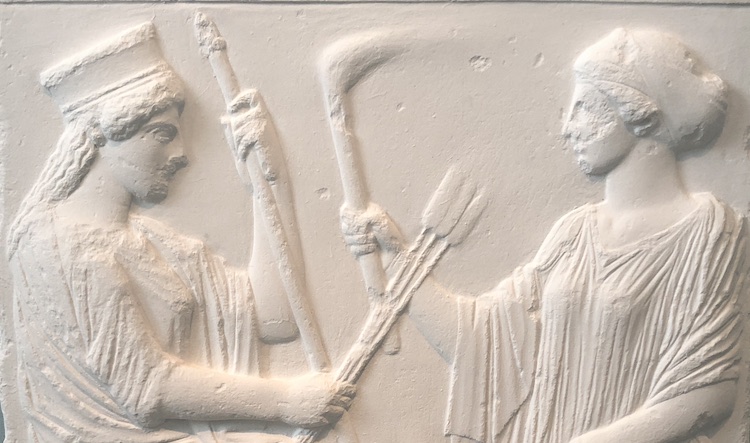-
Content count
11,471 -
Joined
-
Last visited
-
Days Won
52
Posts posted by Aetherous
-
-
Check out https://www.nqa.org/legislation-update
Acupuncturists, massage therapists, etc, have tried to legislate so that qigong would fall under their practice acts, which would mean that unlicensed people wouldn't be able to do it.
For example, we at the forum all know about Ya Mu's extensive qigong training and skill. Imagine if in his home state (which I think is Missouri), some acupuncturist with zero qigong training could call themselves a qigong practitioner, but he suddenly couldn't. That would suck!
The Oklahoma bill seems restrictive, to the point where even Ken Cohen spoke out strongly against it, but it was an attempt by one NQA board member to protect qigong against being regulated under other professions.
Since these processes have started, with acupuncturists and massage therapists trying to get qigong for themselves, to me it seems inevitable that qigong will eventually become regulated at least in some places. Especially as some qigong practitioners have gotten in trouble for giving really poor health advice, and states will want to protect the public by regulating them. -
This group lays out a pretty extensive course of study for the topic. If I remember correctly, it's totally free (aside from getting necessary reading material).-
 2
2
-
-
Boredom is just a stage. Later on, you are enthralled with simply being alive.
-
 1
1
-
-
25 minutes ago, middle_path said:As of right now, I have a very busy life. Work, commute, and family make it difficult to even sit down for more than 5 minutes without just wanting to sleep instead.
With this being the case, perhaps the practice where you do nothing is best, similar to what Fa Xin said. Just be alone in a room, unwind, and finally have a moment to process shit. If you can't help falling asleep during it, then do what Mudfoot said, and stand.
-
 2
2
-
-
Sometimes it seems that the more I learn, the higher my intelligence seems to operate, the more stupid I realize that I truly am.
-
 1
1
-
-
5 hours ago, Mudfoot said:A theory that is easy to test.
If so, when you come out of it you will not feel "air hunger", that is, no urgent need to breathe and no deep breaths.
If you feel air hunger, you have just dampened the physiological drive to breathe.
Personally, I always feel a small (smaller than expected though) urge to breathe more after that happens. Not in the same magnitude as when I voluntary hold my breath though.
That's what was unique about this experience for me, there's zero "air hunger"...for a long period of time. Really, what would cause me to breathe again was fear that my body wasn't breathing.-
 1
1
-
-
Every once in a while I find myself trying to figure out what the Eleusinian Mysteries were all about. Sometimes I find sources which are pretty informative - this thread is to collect those, and perhaps for people to discuss these Mysteries.

Here's one:
http://www.san.beck.org/Eleusis-4.html
This book is quite good, considering that it explores other mystery cults alongside Eleusis:
https://www.scribd.com/document/235729974/Jan-Bremmer-Initiation-Into-the-Mysteries-of-the-Ancient-World-
 1
1
-
-
4 minutes ago, Wondo said:Not argumentaive at all. I think your statements are very useful. What I have experienced may be different than what you have experienced. There are times when it appears that breathing has stopped, but then when I notice it, it resumes. If I stay in an empty state for long periods who knows how long it may have "stopped." I will not share what else I have experienced during those times, but suffice it to say the feeling encompasses the whole body and let's just say that clarity is far reaching.
Okay, from what you've said I think we've had the same experience.
What makes you think breathing is still happening unnoticeably in the LDT, if during this state you're not noticing the breathing/it seems like it has stopped? -
Just presenting an alternative view for the consideration of other readers, not wanting to be argumentative...but I can't agree that any form of breathing happens during it. Also, something else happens during it, which if a person spoke of it, it would verify to me that we've experienced the same thing.
-
I personally go further to say that embryonic breathing is a state in which you don't breathe, and don't need to. We could say that cellular respiration is happening, but any inhale and exhale is not...in my view, it's not a matter of being so subtle so as to be unnoticeable. Experienced it a few times. JMV... I know that some historical writings about embryonic breathing treat it as a method of breathing.
-
The book of Revelation is just so confusing for me, personally. The Lamb's wife or bride being a new Jerusalem coming down from heaven, etc. ...did I just take some LSD?

-
 1
1
-
-
18 minutes ago, ilumairen said:even though there is no argument against a masculine god
To address this...some people say that God isn't a gender, because God isn't created like a human being, but is the Creator. This makes sense, but I don't think we can make the inference based on anything scripturally - there's nothing that really says "God has no gender" in the Bible as far as I'm aware.
An argument that God could be either gender or both is made by pointing to Genesis 1:27, where it says "male and female" are created in "the image of God". So God is both? Neither? Are people like two halves of a previous united whole? Maybe the elohim (spiritual beings in the heavenly realm) are either male or female, just like humans became? Also, Genesis is probably best considered to be metaphorical rather than like a history book...so it's hard to come to any definitive conclusion from it.For Christians, there's the fact that Jesus calls God his "Father". For that reason, it'd be difficult to argue that God is a woman if you're a follower of his teachings.
-
10 minutes ago, ilumairen said:And before I get overly frustrated with the potential endless arguments as to why the holy spirit is not feminine - even though there is no argument against a masculine god, I'm going to take a brief break.
I didn't want the thread to be about gender wars, so much as about exploring the potential truth about this subject...so I kept it out of the men's and women's subforums, and brought it up to general discussion for religious discussion. I'm open to learning about feminine aspects of Divinity, and hope that others end up making some scriptural arguments for that. The fact that wisdom personified was definitely female, and existed prior to the creation of heaven and earth, is very interesting in that regard.
Also: I almost responded to you in the other thread, with a small sampling of scripture that used "he" for the holy spirit. But I looked into it a little deeper, and realized how difficult this subject really is. I might lean toward one side for certain reasons, but it's definitely not cut and dry.-
 2
2
-
-
4 minutes ago, rex said:Some things may get obscured in translation process. For example in Hebrew the word for Spirit is ruach which is feminine - Ruach Elohim, the Spirit of God. Spirit translated into Greek is pneuma, which is gender neutral.
I think this is the primary argument for why the holy spirit would be considered feminine...because of ruach being a feminine word in Hebrew. A side argument could be for the extra-Biblical word, shekinah, being feminine, and Judaism as a whole having this kind of concept (of God's presence being female) as a foundation for Christianity.
But what if in the case of ruach, it was never actually meant to indicate femininity? Similar to what this article described, which I'll quote briefly here,
QuoteFor example, in French the word livre, meaning “book,” is of the masculine gender and is referred to by a pronoun equivalent to the English “he” or “him.” And in Spanish, mesa, or “table,” is in the feminine. Clearly, although these nouns have gender, their gender does not refer to actually being male or female. In the English language, in contrast, most nouns that do not refer to objects that are male or female are referred to in the neuter sense, with the pronoun “it.”
We might note that in the Hebrew language, in which the Old Testament was written, the word translated “spirit,” ruach, is referred to with feminine pronouns. But the Holy Spirit clearly is not female or a woman.
What if the authors of the New Testament knew this, and therefore intentionally didn't use any feminine words in Greek when writing about the holy spirit, but actually sided toward masculine words to describe it (or him)? As opposed to the idea that they made a mistranslation.-
 1
1
-
-
One clear reference to gender, is that of wisdom being personified as female in Proverbs (and here in Proverbs as well...note that what's described here is taking place even before Genesis 1:1. Note that in Genesis 1:2 speaks of the spirit of God, perhaps the same as the holy spirit...in which case, Proverbs may be speaking of this wisdom as being a separate thing from the holy spirit of God).
Christians later contested whether Jesus, the Son, was to be associated with wisdom or not. Note what John said about the beginning, that the Word, aka the Son, was there in the beginning too...and sounds quite similar to what wisdom was saying about itself in the beginning, in Proverbs.
Notions of the trinity always trip me up, personally...this stuff is super hard to understand, but at least for me, kind of fun to try. -
Here's a description from the Bible of what it was like for the apostles to receive the holy spirit. Note that the "speaking in tongues" involved speaking actual languages, which were understood by others who spoke those languages, and wasn't incoherent babbling.
This page gives some scriptural ideas of what this "holy spirit" does and is all about.
-
 1
1
-
-
Here's a little exploration of deriving ideas about gender from the grammar used.
This site makes a case for the holy spirit being personified, rather than being called "it"...because it has to do with the "personal relationship with God" that Christians speak of.
Here's a Catholic priest addressing the question of the holy spirit's gender fairly well. Besides the authors of the New Testament using masculine terms to describe the holy spirit, there's also the fact that the spirit proceeds from the Son and Father...and does it make sense for a female to proceed from two males,?
This site explores the concept of the holy spirit proceeding from the Father and the Son further.
-
 1
1
-
-
This site contains many "early church fathers" and other early Christian sources, which thought that the holy spirit was feminine.
Note that just because these were early church fathers, doesn't mean they were more correct due to being closer to the source, or even that they necessarily agreed with one another. For instance, Origen, who is the first one quoted on that site, was later considered to be heretical.
-
@ilumairen recently stated, in another thread, that the holy spirit used to be considered feminine.
I think this is a potentially rich subject to explore for those who have some interest in digging deeper into the Bible.-
 1
1
-
-
47 minutes ago, Phoenix3 said:I have never heard of a red bird in Daoism.
That's pretty funny, Phoenix.
-
 2
2
-
-
13 minutes ago, escott said:Lately I'm even disappointed in the selection of vegetables we have in the grocery store.
I have big goals for gardening. Fresh is best!
edit to clarify for all: omnivore here, who thinks that dietary fads which ignore health signs and symptoms are a horrible idea. Check out what the American Dietetic Association has to say about the necessity of supplementing for vegan type diets.
-
 2
2
-
 1
1
-
-
I once read a Rinpoche saying that tummo causes all of the channels to collapse. Anyone know more of that idea?
-
 1
1
-
-
-
In my limited experience of these side channels, not related to specific practices which deal with them like the 9 purification breaths (which I've also done, and enjoy)...it seems like these side channels really deal with the entire one side of the body (and not just a line), all the way up to the crown. I think we can activate one side by placing our hand on the side of the head, like basically over the parietal bone of the skull toward the top, or otherwise slightly off center from the crown. Or, when one side has a lot more activity and openness, we can notice that it's open or active up at the side of the crown. The nose seems like it was used as another powerful means of controlling these side channels. Although for a one sided blockage, where there are always issues in various body parts on only one side, I haven't come across a side channel method that truly clears it. Maybe over a long period of time, alternate nostril breathing could.
Ever hear of swara yoga? It's a science (sort of) which deals with the fact that one nostril will be more open than the other at various times throughout the day, which activities best suited to different nostrils, and methods to change the flow to the opposite nostril. They also teach that at sunrise and sunset, when the flow changes from one nostril to the other, there is a period of time in which the central channel is activated, which is the best time for meditation.-
 1
1
-



Do Musicians Singers Cultivate the Most Positive Loving Emotions more than other occupations in the world?
in General Discussion
Posted
If they sing uplifting and moving songs, yes definitely.